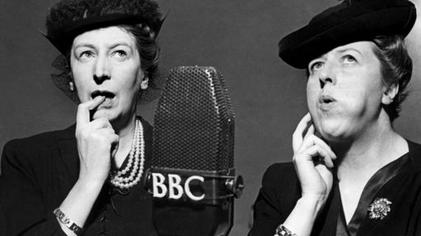Published by: James Cowan – 04/04/2023

In 1895, a young Italian named Gugliemo Marconi invented what he called “the wireless telegraph” while experimenting in his parents’ attic. He used radio waves to transmit Morse code and the instrument he used became known as the radio. In 1906, Marconi shared the Nobel Prize for physics with Ferdinand Braun, a German, in recognition of their contributions to the development of wireless telegraphy. Radio works by changing sounds or signals into radio waves, which travel through air, space, and solid objects, and the radio receiver changes them back into the sounds, words, and music we hear.

A radio broadcast is a one-way transmission, originating from a radio station. In the early 1920s, radio played an important role in people’s lives, and over 500 stations were broadcasting news, music, sports, drama, and variety shows. By the 1930s, most households in Europe and the U.S. had at least one radio. In the evening, the family gathered around a big “console” that was usually located in the living room, where they might spend hours listening to variety shows or comedies from favorites like “The Scoop”, a serial written by members of the Detection Club, which was broadcast on the BBC National Programme.

Everyone used their imagination to visualize all of the characters in their favorite shows. This was the beginning of the “Golden Age of Radio.” British Broadcasting Corporation (BBC), The Radio Corporation of America (RCA), parent company of the National Broadcasting Company (NBC), Columbia Broadcasting System (CBS) and the produced and commissioned shows like “Elsie and Doris Waters” who introduced the radio comedy characters “Gert and Daisy” and other BBC Dramas.
Before and During World War I
Prior to the 1920s the radio was primarily used to contact ships that were out at sea. Radio communications were typically achieved by the use of Morse code messages. This was of great benefit to vessels in the water, particularly during emergency situations. With World War I the importance of the radio became apparent and its usefulness increased significantly. During the war, the military used it almost exclusively and it became an invaluable tool in sending and receiving messages to the armed forces.
Radio and the 1920s
In the 1920s, following the war, radios began to increase in popularity amongst civilians. Across the U.S. and Europe, broadcasting stations such as KDKA in Pittsburgh, Pennsylvania and England’s British Broadcasting Company (BBC) began to surface. In 1920 the Westinghouse Company applied for and received a commercial radio license which allowed for the creation of KDKA. KDKA would then become the first radio station officially licensed by the government. It was Westinghouse which also began advertising the sale of radios to the public. Home-built radio receivers were a solution for some and began to create a problem for the manufacturers who were selling them. As a result the Radio Corporation Agreements, RCA, was sanctioned by the government. Under RCA, certain companies could make receivers, while other companies were approved to make transmitters. Only one company, AT&T, was able to toll and chain broadcast. It was AT&T that, in 1923, released the first radio advertisement. In the late 20s, CBS and NBC were created in response to AT&T being the sole station with rights to toll broadcasting.
In Britain, radio broadcasts began in 1922 with the British Broadcasting Company, or BBC, in London. The broadcasts quickly spread across the UK but failed to usurp newspapers until 1926 when the newspapers went on strike. At this point the radio and the BBC became the leading source of information for the public. In both the U.S. and the U.K. it also became a source of entertainment in which gathering in front of the radio as a family became a common occurrence in many households.
World War II and Changes Following the War
During World War II, the radio once again fulfilled an important role for both the U.S. and the U.K. With the help of journalists, radio relayed news of the war to the public. It was also a rallying source and was used by the government to gain public support. In the U.K. it became the primary source of information after the shut-down of television stations. The way in which radio was used also changed the world after World War II. While it had been a source of entertainment in the form of serial programs, it began to focus more on playing the music of the time. The “Top-40” in music became popular and the target audience went from families to pre-teens up to adults in their mid-thirties. Music and radio continued to rise in popularity until they became synonymous with one another. FM radio stations began to overtake the original AM stations, and new forms of music, such as rock and roll, began to emerge.
The Present and Future of Radio
Today, radio has become much more than Tesla or Marconi could have ever imagined. Traditional radios and radio broadcasting have steadily become a thing of the past. Instead it has steadily evolved with more satellite radio and Internet radio stations. Radios are found not only in homes, but they are also a staple in vehicles. In addition to music, radio talk shows have also become a popular option for many.

Enjoy Radio
In July 2020, during the first Covid lockdown, Enjoy Radio was born. It came about from long, late night conversations between James Cowan and Alan Straughton. Together, with Brad they have built up Enjoy Radio to what it is now, and have a fantastic team of presenters and people working behind the scenes – all as volunteers.
In 2020, Enjoy Radio also became ambassadors for Purple Angels. The Purple Angel was born on 12th January 2012. It was formed as a steering group to try and make Torbay the first Dementia Friendly resort in the country. Norman McNamara a resident of Torbay, Devon, UK was diagnosed with dementia at only 50 years of age. Whilst out shopping one day he was rudely spoken to by a shopkeeper and decided to change the way people see dementia and treat others. You can find out more about the Purple Angels Here.
In 2023, we started promoting Andy’s Man Club which is a men’s suicide prevention charity, offering free-to-attend peer-to-peer support groups across the United Kingdom and online. More info Here
Enjoy Radio has gone from strength to strength since we started back in 2020, and we have now secured a number of sponsors for the station who are helping us to keep broadcasting to our many listeners.
